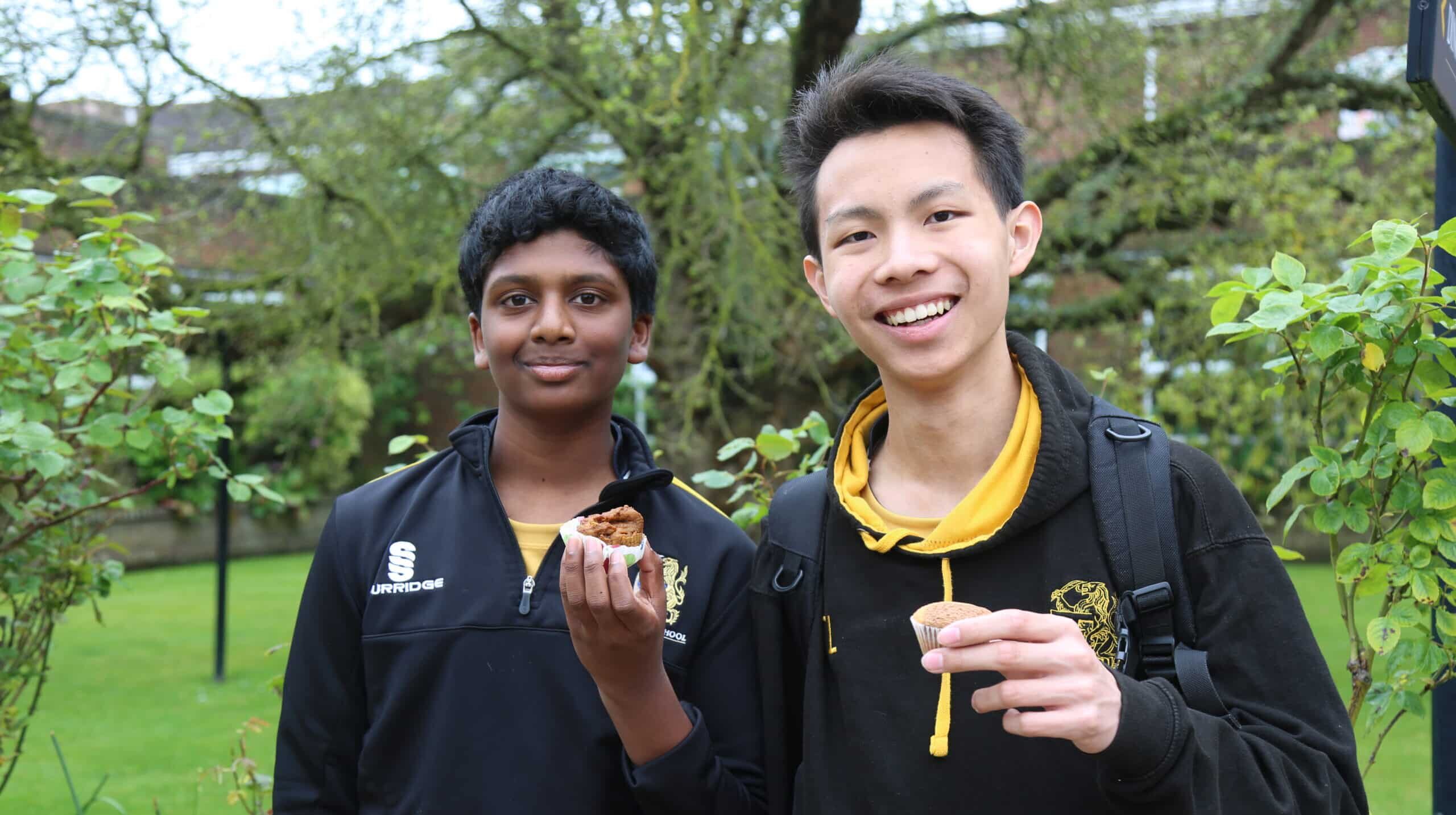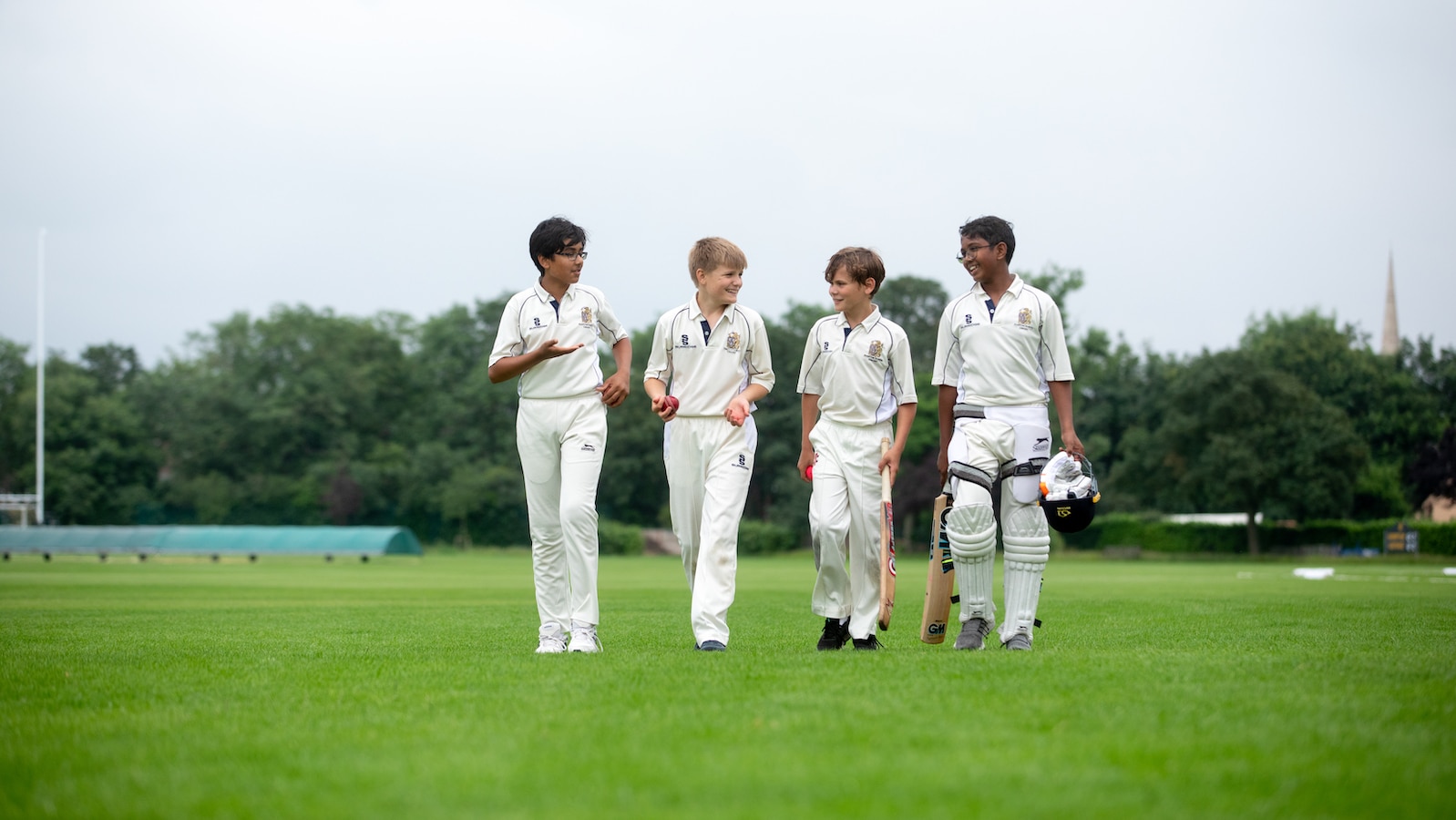Welcome to the Third Year Blog!
The Third Year Blog likes to celebrate the successes of the Third Year Hamptonians. Uniquely, perhaps, in the world of Independent School year group blogs (a fiercely competitive field, as I am sure you will be aware), it also likes to acknowledge their catastrophic failures. The Third Year blog likes to innovate.
Robert F. Kennedy once said that ‘only those who dare to fail greatly can ever achieve greatly’. Little did he realise that he could well have been talking about Hampton’s U14A cricket team in 2024.
The quote is an interesting one, in that it seems to equate the ambition to fail really badly with the possibility of great success. Fundamentally, he is talking about taking risks and being prepared to not not necessarily play safe in your decisions, which certainly has merit. It would also be possible to argue that these are the words of a gambler as opposed to those of a wise man.
Alternatively, we could consider these thoughts:
‘The only real mistake is the one from which we learn nothing.’ Henry Ford
‘The secret of life is to fall seven times and to get up eight times.’ Paulo Coelho
What both of these ideas touch on is the sense that failure is inevitable. No one is successful all the time. The key is to both learn from your mistakes, but also to have the persistence to keep trying in the aftermath of your failure. Fortunately for the U14A cricket team, they have the opportunity to test these ideas in real life. More on that below…
In addition to this it does, once again, feel as if the Third Year blog has fallen into the pit of ‘delivering you a message that could be relevant for your upcoming exams’. It is entirely unintentional, I can assure you.
Beyond a heavy focus on last weekend’s cricket, we also have a report on an excellent TALK that the boys were able to attend this week, and the opportunity to read the start of a tale of EPIC heroism. Of course, we also have Two Truths and a lie and Connection Corner.
Let’s get into it!
Heads of Year Message
Exams
Third Year Exams will take place during the week commencing Monday 20 May (the week before half term). Departmental study guides and/or revision check lists can be found in the respective departmental areas on SharePoint. If any pupil is uncertain where to find revision materials, they should speak to the relevant subject teacher as a matter of priority next week.
Homework
In order to facilitate time for revision, we have asked all First to Third Year subject teachers not to set any ‘new’ homework in the two weeks immediately prior to the exams (or during exams week itself). Teachers may set guided revision tasks as homework if they deem that to be helpful.
Whilst we are advising the boys to make the most of the time available to revise over the coming weeks (using their homework timetable as a basic framework for revision, whilst no new homework is set), we continue to support their engagement in a range of sporting and co-curricular activities. Although this can lead to some busy schedules, we believe that it is essential for the boys to maintain a balanced approach to school work, sport and other co-curricular activities, leisure and family time, combined with a healthy diet and regular sleep throughout this period.
Absences
For medical absences, please notify your son’s Form Tutors via email (cc’ing absence@hamptonschool.org.uk) on the morning of each day of absence by 8:45am, or complete the absence form via the parent portal. For planned absences and appointments, please contact Heads of Year requesting the absence with as much notice as possible.
Boys – keep up the good work over this weekend and into next week. This is the time to make your preparations for exams count. Stick to your revision schedules. Continue to be thoughtful and kind to the people around you. As always, let us, your Form Tutors or the relevant subject teachers know if you are having any difficulties.
We hope that everyone has a lovely bank holiday weekend.
Best wishes
Mr T Rigby & Mrs M Bedford
Cricket Aplenty
The U14 cricket squad is a strong one with plenty of outstanding cricketers. Cricket, however, is a brutal sport, physically, mentally and emotionally. Having created a scenario at the weekend where they had bowled Tiffin out for a modest 67 runs (thanks to 3 wickets each from Rufus L and Sanjit B), the U14A team then found themselves cruising along at 59 for 2, needing 9 runs with 8 wickets in hand. From this position of apparently unassailable strength, they tumbled to a shocking defeat that had loud voices in the Common Room calling for the head of Mr Hooper, the team’s coach. So what happened? The Third Year blog has conducted interviews with the entire team to establish what they experienced, how it unfolded and what they learnt.
Speaking to the players, there is clear sense of initial calm and confidence. Opener Oliver K describes opening the batting and feeling ‘there wasn’t that much pressure on me’ as we ‘only needed 67 runs’. His description of getting out ‘caught by mid off having toed a ball that should have gone to the boundary’ hints at a slight sense of complacency as does the belief that ‘I was very certain that we would win the game’ as, when he was dismissed, the team needed 60 runs with 9 wickets left. Complacent? Yes. A likely accurate assessment in normal circumstances? Also, yes.
This potential complacency is continued by the other opener Aarav D’s admission that as he prepared for the ball that ultimately dismissed him, the only question in his mind was whether to try to hit a ‘4 or 6 as the whole over I had not got a single run’. As it turned out, the ball was a poor one, meaning Aarav’s decision was to go for a 6 (there are no fielders in the sky, after all). Unfortunately there was one at mid off where the ball ultimately went. Having said this, by this point, the team only needed 20 more runs – why shouldn’t Aarav try to get everyone into tea early?
The next wicket to fall was Will B. By this point, the team needed just 9 runs to win. Will’s thought upon getting out was that victory was ‘set in stone’ as ‘we still had 7 wickets remaining’. Little did Will realise the team would score just 4 more runs. Will expressed frustration at not being able to see the team home, and took away the learning that he should ‘leave the ball outside leg in April as it is likely to get stuck in the pitch’, suggesting both a lesson learnt and the endless ability of batsmen to lay the blame for their wicket at misfortune relating to conditions.
Now came the carnage. Even at this point though, there was a sense of confidence – of course there was. Xavier K describes waiting to face the ball that got him out feeling ‘very calm as we only needed around 6 to win’. The word ‘around’ betrays his confidence here – the number of runs was irrelevant as victory was inevitable. And, normally he would be right.
Ashton C then walked to the crease ‘feeling pretty in control having had a few good knocks prior’. As the ball came down towards him, he describes his instincts taking over and aiming a ‘slog sweep to the short boundary to win it. The ball dipped sharply into my chest and then onto the wickets.’ As he departed, while still feeling confident, he also describes how ‘the pressure just built too much’. Of course, the key is to try to ensure that that pressure doesn’t have an impact on the decision making of the team.
The next wicket to fall was Sanjit B, who was run out. Anyone who has played cricket understands the impact a run out can have and what it suggests. The fielding side will be cockahoop and a run out only comes through miscommunication and panic. But surely no panic here… Sanjit himself says that ‘even when I got out, we still had five batters to come who were all capable of scoring 40 individually, let alone 4 between them.’ He also observes that he ‘hadn’t even unpadded when two more wickets fell and suddenly annoyance turned to confusion, disbelief and then dread.’ Ah, the beauty of cricket!
Now we can sense the heat being turned up. Next batsman, Jatin C, describes heading ‘out to the crease, one thigh pad hanging off because of how quickly I had needed to pad up and still in shock’. This shock evidently affected poor Jatin’s thought processes as he describes seeing the ball come at him and thinking it ‘would be a wide’ and leaving it. Free runs! Having made this decision, his description continues: ‘I ended up getting clean bowled. I then realised; I didn’t pick the googly’. Evidently not! But what a delivery it must have been!
The collapse is in full swing. What a new batsman needs at this stage is a nice, easy sighter – something they can leave. Rufus L was certainly feeling this, describing ‘just attempting to not get out and get to the non-strikers end’. No such luck as he was yorked first ball. ‘After I got out, I was shocked at how good the delivery was, but then felt ashamed that I let my team down.’ This is a selfless reaction particularly as Rufus’ feeling was that the ball was so good that ‘if I was facing the same delivery I think I would have to get extremely lucky to play the ball.’ The idea that the only decision in a batsman’s mind as the ball was being delivered was whether to try to hit it for 4 or 6 seems a long way away at this point.
Isaac M was the next to fall. Unlike Ashton, Sanjit, Jatin and Rufus (all very capable batsmen, for what it is worth) who had combined for 0 runs off 5 balls, Isaac had scored a run. It was only one run, but he had scored. With this run in his pocket, he was looking for another single, aiming a sweep towards a gap in the field – ‘however, I skied the ball and the fielder caught it easily’. As Isaac departed, he felt that ‘we probably had a 50% chance to win as we had one wicket left, but we only needed a few runs’. Even at this stage, there is still some confidence left.
The final pair were Jack H and George E. Jack ‘knew that my goal was to block my first few balls so I could get my eye in and see off their two bowlers who had got most of their wickets. After blocking three balls, their pace bowler came back on.’ Clearly, this is a sentence a tailender hopes never to have to utter, particularly in this situation. Fortunately for Jack, he was also able to start the next sentence of his description with ‘Standing at the non striker’s end’, which is the ideal thing for a tailender to be able to say in this situation.
This leads us to George E whose sweaty palmed description captures the moment well:
‘I was batting number 10 and it didn’t seem real as I saw Rufus sprinting onto the pitch. Panic was setting in. I scrambled to put on my pads then quickly ran out after Rufus got bowled. I watched Isaac get caught then Jack H come in. Jack faced the spinner perfectly, blocking the last 3 balls. Then it was over, I came onto strike against their opening bowler that came back on. I was too early and chipped it for an easy catch at mid on. That was the game. 6 ducks in a row.’
For those of you who enjoy English you will notice the monosyllabic, simple sentences George ends on here, perfectly capturing the dejection of the side.
There was one other player, left in the frankly perfect situation of not being allowed to bat and therefore being able to distance himself from the collapse while also making claims about what role he would have played in guiding the side to victory. Oh, what might have been! In his words, Max P suggests that if this situation were to happen again, he would ‘take matters into my own hands and decide to bat instead of one of the tailenders.’ A bold claim to make and one which we will never know the success or otherwise of. The image of Mr Hooper sternly preventing poor Max from effortlessly winning the game is one that is clear in the mind of the Third Year blog.
There endeth the tale. It is undoubtedly one of failure. But it is also one that they can and will learn from. All of the players express varying degrees of shock and shame in their descriptions and responses. But all of them have now lived through that scenario, so next time will be better placed to use their enviable skills and abilities to prevent it happening again.
To return to the original aphorisms:
‘The only real mistake is the one from which we learn nothing.’ – Henry Ford
‘The secret of life is to fall seven times and to get up eight times.’ – Paulo Coelho
The Third Year blog would like to thank all of the players for their openness and honesty in being willing to write about what will still be a raw wound. We also look forward to future reports of glorious victory!
TALK! Professor Ian Davis and David Peppiatt
On Wednesday 1 May, the Hammond Theatre was graced by not one, but two Alumni, Professor Ian Davis and David Peppiatt, who are both experts in the field of humanitarian aid. Their expertise was clearly conveyed through their thoughtful comments on current attitudes to foreign aid and how it has changed over the past fifty years.
As a senior member of the Red Cross, David Peppiatt played a large part in developing the policy of giving hard cash to victims of disasters. This was done because most people said they would rather have the choice to spend money on what they would want in a crisis, rather than just have a blanket and food forced upon them. According to David, in most cases people would simply take their aid packages straight to the local market and sell them. The giving of cash seemingly allowed for more flexibility in aid packages and whilst there was initial resistance, due to the stereotype that the money would be wasted away, it has significantly changed the way the Red Cross operate.
Professor Davis is a visiting professor all over the world, from Europe to India. He is a world-renowned expert on humanitarian aid and has a vast knowledge of the topic. He was able to recount many past experiences of his which showed how the giving of aid to those afflicted by disaster had changed. Both experts agreed that climate change was causing more and more disasters every year and that the solutions were slowly but surely being outpaced by the climate crisis. However, both men insisted that the future is not as bleak as it may sound, many people do give to charity and these donations positively impact peoples’ lives.
Overall, I believe that this Talk! was revealing and insightful on the topic of humanitarian aid. The combined experiences made for interesting listening, and they dissected the questions with ease. It was a wonderful opportunity to hear from two Alumni and it is a Talk! that will remain fondly in my memory.
By Rory M (3A)
A new legend
This week we have a new additional feature. Lucas Z has been writing a series of stories that we are going to be sharing. He has created an entire story line stretching across the Universe and through time, so it may even be too much for the blog to successfully cover, but we have the first installment this week, which introduces the history that leads to the stories that will ultimately be shared.
So, if you are interested in finding out about the brutality of Mazog the Defiler, amongst other things, click on the link here.
Two Truths and a Lie
Last week, Mr Hooper, the U14A football and cricket coach, besmirched his reputation with a series of lies. One of his claims was true, but which one?
- Mr Hooper’s father played professional cricket
- Mr Hooper has a maths A level
- Mr Hooper played football for the ISFA U18 England team
Mr Hooper does have a Maths A level. In truth, those are two for a penny, so we don’t need to be impressed by this. His father did play professional cricket – presumably, he has never been involved in a team losing eight wickets for four runs as a coach, or as a player. What this means is that Mr Hooper didn’t ever play football for the ISFA U18 England team. He was close, as he made it as far as representing ISFA for the south of England, which is pretty impressive!
This week we have Miss Embiricos of the Modern Languages department. Frankly, I’m not sure that any of these are true…
- Miss Embiricos’ cousin is in the movie Fantastic Beasts
- Miss Embiricos’ favourite food is sea urchin
- Miss Embiricos has represented Greece in the Ultimate Frisbee World Cup
Connection Corner
Well done to the everyone who had a go at last week’s Connection Corner. Well done to everyone who correctly guessed that the answers were all Salads, big shout out to Krishang T, William O’S, Kian IB, Ambrose B, Rory M, Kiran G, Christopher K, Olly P, Harry W, Darshan S and Bailey HC. Another tricky one to have a go at over the weekend:
In case you’re still perplexed, here are the answers from the last week’s conundrum:
King Edward, Jersey, Maris Piper and Yukon Gold, are all types of what? Potatoes
Rhodes, Santorini, Mykonos and Zakynthos, are all more commonly known as what? Greek Islands
Who led the Roman invasion of Britain in 55 BC? Julius Caesar
Guava, acai, dragon and durian are all types of what? Fruit
Connection: Different types of salad (Potato Salad, Greek Salad, Caesar Salad, Fruit Salad)











